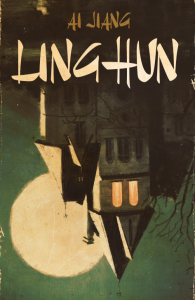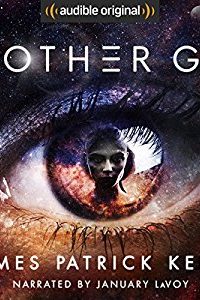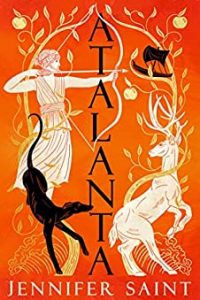Alex Brown Reviews Linghun by Ai Jiang
 Linghun, Ai Jiang (Dark Matter INK 978-1-95859-802-3, $14.99. 150pp, tp) April 2023.
Linghun, Ai Jiang (Dark Matter INK 978-1-95859-802-3, $14.99. 150pp, tp) April 2023.
Not far from Toronto is a place known as the Homecoming of Missing Entities, or HOME to its residents. It is a place where the lucky are able to buy or win at auction a house where their dead can visit and the unlucky are condemned to sleeping on the lawns of homes they dream of owning. For some, the town is a blessing, a wish on a genie’s bottle, a chance to do things right this time. For others, it is a spider’s web, and they’re trapped at the center watching the life drain out of them. Wenqi’s family manages to acquire a house in HOME after the death of her brother. This is where Ai Jiang’s gothic horror novella Linghun begins its unsettling tale.
Part of the thrill of Linghun is the way Ai Jiang gradually reveals information and backstory, which is great for the reader but challenging for the reviewer. The short version is that Wenqi’s family moves to HOME to recover the ghost of the son who died years before, when he was a child. Wenqi was even younger than him when he died, so she has few clear memories of him. Her mother is obsessed with her dead son; in his life he was the center of her world, and in his death he is all she can think about. Her father misses his son dearly, but is too busy juggling keeping his family together, not dealing with his feelings about his son’s death, and managing his wife’s turmoil to do anything productive or helpful.
Besides the people longing for the dead, the town is also occupied by lingerers, those who moved to HOME but could not afford a house. They camp out on the lawns of the homes they want to live in, a permanent queue. Homeowners ignore them, and the town keeps them mostly alive with gruel, but otherwise they live a liminal existence, caught between death and life. One of those lingerers is Liam, a boy brought to HOME by his parents a few years before Wenqi arrives. They drift around Wenqi’s neighborhood butdon’t formally meet until school. Neither teen wants to be in HOME, but neither know what to do about it.
Liam and Wenqi are two of the three points of view in Linghun. The third is a Chinese widow known only as Mrs. who lives in the house across the street from Wenqi, the only unhaunted house in a town of haunted houses. This is where it gets really interesting, craft-wise. Wenqi’s chapters are written in first person, Mrs.’s in second, and Liam’s in third. It should feel jarring or disjointed, but Jiang makes it work. She brings us right into Wenqi’s mind, an uncomfortably intimate experience, yet keeps us at a distance from Liam, for reasons that become clear toward the end. With Mrs., we think we know her, but she doesn’t even know herself. Her life has always been defined and redefined by others. She is a character, a composite, a sketch of a figure. Shoving the reader into that with second person is discomfiting, like a discordant note, a trick that only enhances the gothic horror sensations.
It’s tempting to say Linghun is about grief, but I think it’s really about what happens when you don’t grieve. The people living in HOME are not consumed by grief, but consumed by avoiding it. By bringing the dead back into their lives, they can pretend like nothing ever happened. Wenqi’s mother sees her son’s spirit as a real, living child, but Wenqi herself sees only static-y haze. For outsiders, there’s nothing to see at all. Wenqi was young enough to not have much grief to process, while her parents are doing everything in their powers to not go through the process. The lingerers are willing to wither away in the hope of maybe possibly one day getting a home of their own rather than confront what they lost and work through it.
If offered the chance to fix things, to assuage your guilt, make things different this time, would you? What would you be willing to sacrifice for that? What price is too high? Ai Jiang asks these questions, and the answers the reader gets may not be the ones they want. But she also offers hope. Wenqi knows what her parents and the other denizens of HOME do not: that grief must be experienced, and that holding on too tightly to the past denies the living their future. A haunting, compelling novella, Linghun is a must-read.
Alex Brown is a librarian, author, historian, and Hugo-nominated and Ignyte award-winning critic who writes about speculative fiction, young adult fiction, librarianship, and Black history.
This review and more like it in the April 2023 issue of Locus.
 While you are here, please take a moment to support Locus with a one-time or recurring donation. We rely on reader donations to keep the magazine and site going, and would like to keep the site paywall free, but WE NEED YOUR FINANCIAL SUPPORT to continue quality coverage of the science fiction and fantasy field.
While you are here, please take a moment to support Locus with a one-time or recurring donation. We rely on reader donations to keep the magazine and site going, and would like to keep the site paywall free, but WE NEED YOUR FINANCIAL SUPPORT to continue quality coverage of the science fiction and fantasy field.
©Locus Magazine. Copyrighted material may not be republished without permission of LSFF.






